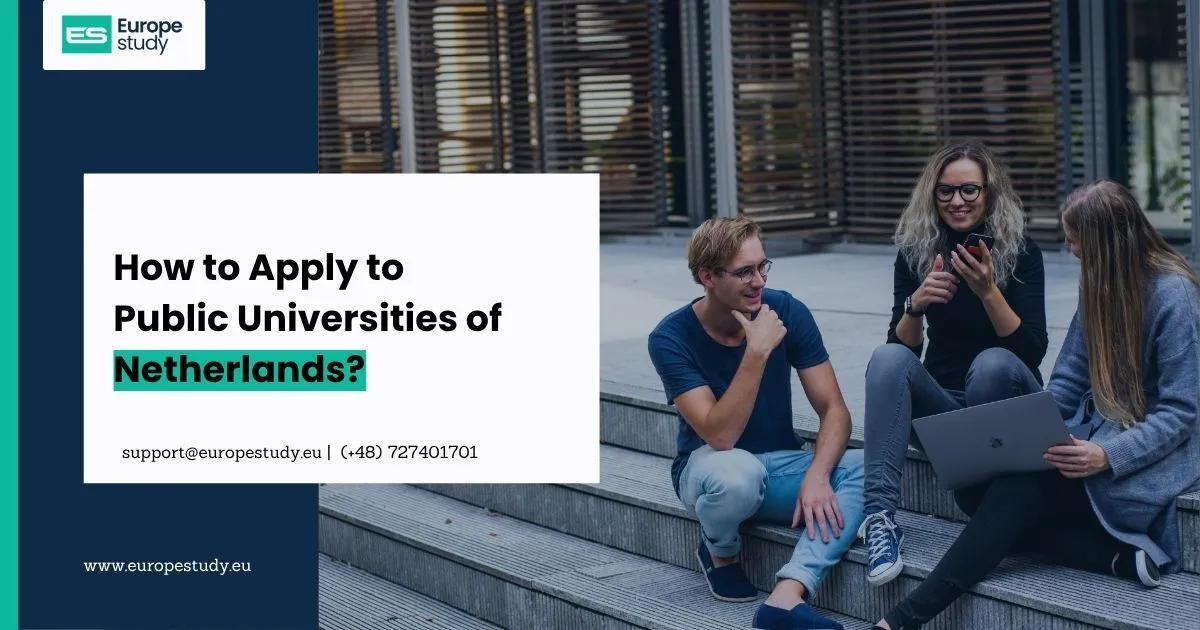
How to Apply to Public Universities of Netherlands?
The Netherlands is a top destination for international students, offering a wide variety of English-taught programs and high-quality education. If you're planning to apply to a Dutch public university, your journey will likely begin on Studielink, the national online registration system. In addition to Studielink, many universities have their own application portals where additional documents may need to be submitted.
1. Register on Studielink
Your first step is to create an account on Studielink, the official platform for applying to higher education institutions in the Netherlands. You’ll need to:
-
Provide personal information, including passport details
-
Choose whether you're applying from within or outside the Netherlands
-
Set up your account with a valid email address
Make sure your information is accurate, as it will be used throughout the application process.
2. Explore and Select Programs
Once your Studielink account is active, you can search for available programs across Dutch universities. You can also explore options directly on the universities’ official websites to get more detailed descriptions of:
-
Course content
-
Entry requirements
-
Application deadlines
-
Tuition fees
-
Language of instruction (English or Dutch)
Choose the program(s) that align with your academic goals and submit your initial course selections via Studielink.
3. Review Admission Requirements
Each program has its own set of admission criteria, which typically include:
-
Academic qualifications (high school diploma, bachelor's degree, etc.)
-
Language proficiency (usually IELTS, TOEFL, or Cambridge English for English-taught programs)
-
Specific subject requirements (for example, mathematics for engineering courses)
-
Additional items such as portfolios, motivation letters, or references (depending on the program)
Check the university's website for precise details.
4. Gather Required Documents
Prepare the following documents for upload:
-
Certified academic transcripts and diplomas
-
Valid passport or national ID
-
English or Dutch language test scores (if applicable)
-
CV or résumé (for master’s programs)
-
Motivation letter or personal statement
-
Letters of recommendation (if required)
Some universities may ask for translations of your documents if they are not in English or Dutch.
5. Apply Through Studielink
Complete and submit your application via Studielink. The platform will walk you through the required fields, and you can apply to up to four programs at once, including a maximum of one numerus fixus (selective) program.
6. Complete University-Specific Requirements
In many cases, after applying via Studielink, you'll receive an email from the university with instructions to:
-
Log into their own application system
-
Upload supporting documents
-
Pay application fees (if applicable)
-
Complete questionnaires or essays
It’s important to follow these instructions promptly, as your application may not be considered complete until both systems are updated.
7. Track Your Application
You can monitor the status of your application through:
-
Studielink: for general registration updates
-
The university’s online portal: for admissions decisions, requests for more documents, or interview scheduling
Make sure to check your email regularly for updates.
8. Receive Admission Decision
Once your application has been reviewed, you’ll receive an offer or rejection via email and/or the university portal. If accepted, you'll be asked to confirm your spot, often by signing a contract or paying a deposit.
9. Apply for a Student Visa (if applicable)
If you're a non-EU/EEA student, you'll need a student visa and residence permit. Once you’ve accepted the offer:
-
The university will usually initiate the visa application on your behalf
-
You’ll need to provide additional documents such as proof of funds, insurance, and a valid passport
-
Visa processing may take several weeks, so start early
Important Tips and Considerations
-
Check Deadlines: Application deadlines vary between universities and programs. Many bachelor’s programs close applications by January or May, while master’s deadlines vary widely.
-
Language Proficiency: Ensure your language scores meet the program's requirements before applying.
-
Numerus Fixus Programs: These are competitive programs with limited seats (e.g., medicine, psychology). Applications typically close early (January 15) and may include additional selection steps.
-
Stay in Touch: Don’t hesitate to contact the university’s international office for guidance or clarification.
Applying to a Dutch public university is a structured but straightforward process when approached step by step. With the university’s internal platform, preparing your documents early, and keeping track of deadlines will put you on the path to studying in one of Europe’s most innovative and welcoming education systems.





